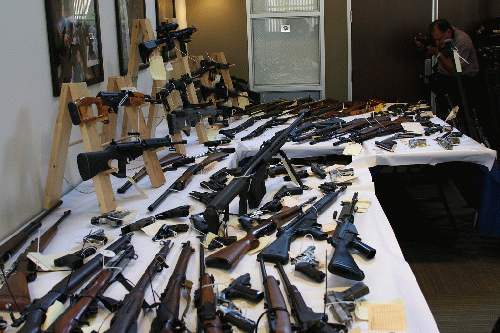New research by public health specialists at the Boston University School of Public Health and Boston Children's Hospital shows that three kinds of gun laws save lives, and they all are designed to keep lethal weapons out of the hands of violent people.

Confiscated firearms, California, 2011
(Image by Office of the Attorney General, State of California) Details DMCA
Community health researcher Michael Siegel and his colleagues performed the first simultaneous controlled statistical study of the relationship between different gun laws and homicides in all 50 states, covering the years 1991 through 2016. Out of many different kinds of gun-related laws they studied, they found that three had powerful positive or negative impacts. Universal background checks preventing convicted violent felons from owning guns produced a 15 percent reduction in overall homicides. Laws blocking people convicted of violent misdemeanors cut the homicide rate by 18 percent. In contrast, "shall issue" laws that prevent authorities from using any discretion in granting concealed-carry permits resulted in a 9 percent higher homicide rate.
The researchers found that states with positive forms of all three laws--universal background checks preventing both felons and people with violent misdemeanors from buying or owning guns, and laws giving authorities the right to deny concealed-carry requests from people deemed risks to themselves or others--benefited from 33 percent lower homicide rates.
For this study, the researchers excluded deaths from legal interventions (e.g. deaths at the hands of police), accidental firearm deaths and firearm deaths whose intent wasn't determined--in total 4.5 percent of firearm-related deaths. They also controlled statistically for many variables known to impact firearm fatalities, including the racial mix of each state, the percentage of young men between the ages of 15 to 29, divorce, unemployment, poverty, and the rate of violent crimes other than homicide.
and the rate of violent crimes other than homicideand the rate of violent crimes They found that limiting dangerous people's access to guns is the most effective legal intervention, saving more lives than, for example, trying to limit the kinds of firearms that are available. Asked to summarize the implications of the study for policy makers, Siegel writes:
"Our research suggests that focusing on the "WHO" (i.e., who has access to firearms) is more impactful than focusing on the WHAT (i.e. what types of firearms are allowed). Based on these findings, the priorities for state policy makers should be: (1) universal background checks; (2) laws that prohibit gun purchase or possession by people with a history of violence (a conviction); and (3) extreme risk protection order laws that provide a mechanism for removing guns from people at high risk of violence to themselves or others."
Given that between 10 and 20 thousand Americans die every year from gun violence, laws implementing these recommendations in all 50 states could and would save thousands of lives.
------
You can access the research paper, published in the Journal of General Internal Medicine, at this URL.
(Article changed on March 31, 2019 at 13:52)
(Article changed on March 31, 2019 at 14:39)
(Article changed on March 31, 2019 at 18:54)




